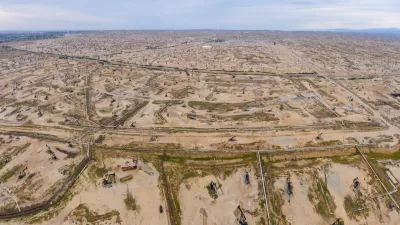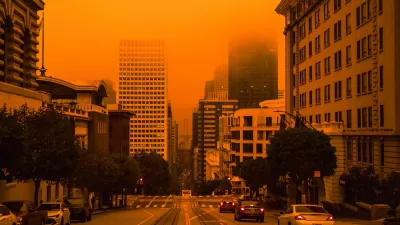Climate action plans cannot succeed without bona fide action on social equity and job creation, argues Murtaza Baxamusa who teaches planning at USC and develops affordable housing Murtaza Baxamusa.
While many of the climate action plans, now adopted in over 120 cities and counties, pay lip service to social and economic justice, too few contain concrete and specific actions at a level equal to the environmental standards of the documents, argues Murtaza Baxamusa, Ph.D., AICP, who develops affordable housing for the San Diego Building Trades Family Housing Corporation and teaches urban planning at the University of Southern California (USC).
"Sustainability is framed as a three-legged stool consisting of the three ‘E’s: environment, economy and equity. However, the third leg, social and economic equity, is often the weakest," says Baxamusa.
He goes on to note:
In an earlier article, I have argued that community empowerment is a necessary condition for sustainability. This is because empowerment balances out the forces that make our world unsustainable. I will further argue that sustainability itself can distribute justice, creating a benevolent reinforcing cycle between empowerment, engagement and equity. For example, sustainable modes of commuting like transit, walking and biking promote social movements through increased social interactions in the public domain. And consequently, these social movements both use and politically support these modes.
Baxamusa also proposes three strategies for "integrating equity within climate actions plans:"
- Establish enforceable thresholds for equity issues such as poverty/income, affordable housing, transportation/transit, and targeted socio-economic benefits.
- Integrate equity in the administration and implementation of all environmental plans, policies and regulations throughout city departments.
- Institutionalize diversity in terms of both leadership, as well as in outreach among stakeholders.
FULL STORY: Why climate change action cannot succeed without social equity

Alabama: Trump Terminates Settlements for Black Communities Harmed By Raw Sewage
Trump deemed the landmark civil rights agreement “illegal DEI and environmental justice policy.”

Study: Maui’s Plan to Convert Vacation Rentals to Long-Term Housing Could Cause Nearly $1 Billion Economic Loss
The plan would reduce visitor accommodation by 25% resulting in 1,900 jobs lost.

Why Should We Subsidize Public Transportation?
Many public transit agencies face financial stress due to rising costs, declining fare revenue, and declining subsidies. Transit advocates must provide a strong business case for increasing public transit funding.

Paris Bike Boom Leads to Steep Drop in Air Pollution
The French city’s air quality has improved dramatically in the past 20 years, coinciding with a growth in cycling.

Why Housing Costs More to Build in California Than in Texas
Hard costs like labor and materials combined with ‘soft’ costs such as permitting make building in the San Francisco Bay Area almost three times as costly as in Texas cities.

San Diego County Sees a Rise in Urban Coyotes
San Diego County experiences a rise in urban coyotes, as sightings become prevalent throughout its urban neighbourhoods and surrounding areas.
Urban Design for Planners 1: Software Tools
This six-course series explores essential urban design concepts using open source software and equips planners with the tools they need to participate fully in the urban design process.
Planning for Universal Design
Learn the tools for implementing Universal Design in planning regulations.
Smith Gee Studio
Alamo Area Metropolitan Planning Organization
City of Santa Clarita
Institute for Housing and Urban Development Studies (IHS)
City of Grandview
Harvard GSD Executive Education
Toledo-Lucas County Plan Commissions
Salt Lake City
NYU Wagner Graduate School of Public Service





























